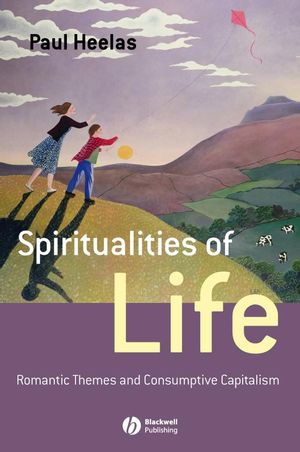Spiritualities of Life: New Age Romanticism and Consumptive CapitalismISBN: 978-1-4051-3937-3
Hardcover
296 pages
April 2008, Wiley-Blackwell
 Other Available Formats: Paperback
|
||||||
"[Heelas] convinced me, a skeptic when encountering his book, that new age philosophies are more complex than their American Journal of Sociology critics allow." (American Journal of Sociology, November 2009)
"Heelas' style is, as ever, measured, elegant and good-humored, and this book will undoubtedly appeal to, and be accessible to, those outside the academy who are interested in religion and culture, and who might wish to think through the changing spiritual landscape in Britain today." (Theology, November 2009)
"His emphasis is on inner-life spirituality or simply 'spiritualities of life,' rooted in a universal human potential and developed by a variety of effective practices. [He] makes plausible the importance of holistic forms of complementary and alternative medicine. Recommended." (CHOICE, November 2008)
"Well prepared after his path-breaking books The New Age Movement (1996) and The Spiritual Revolution (2005, with Linda Woodhead), Paul Heelas now bravely enters the minefield. Tracing the trajectory of spiritualities of life from the Romantics to contemporary wellbeing culture, he convincingly critiques the widespread tendency to depict them as 'mere consumption'. Well written, clearly argued, and richly documented, Spiritualities of Life sheds light on contemporary spirituality and consumer culture alike."–Dick Houtman, Erasmus University, the Netherlands
"This is an engaging and lively discussion about the nature of
spirituality in contemporary society. It shows Heelas at his best -
original, creative, imaginative and searching intellectual
questions."
–Jeremy R. Carette, Kent University
"Paul Heelas' work in charting the subjective turn in
contemporary spiritualities has been one of the most important
contributions to the field of the sociology of religion in the past
decade. In Spiritualities of Life, Heelas offers a
passionate defence of this spiritual movement, and argues that it
represents a viable moral and cultural resource for the modern
world. By positioning himself as an advocate of the movement that
he has traced so effectively, Heelas poses questions about the
nature of the good life and contemporary forms of the sacred that
no serious scholar of religion can afford to ignore."
–Gordon Lynch, Birbeck College, London
"The quicksilver shape of popular spirituality today is hard to
hold in focus… This sharp-eyed, sure-footed book is equal to
the task, and unequaled in its revelations of a God within the
unbounded self of an expressive humanism that embraces all of
life."
–Steven M. Tipton, Emory University



